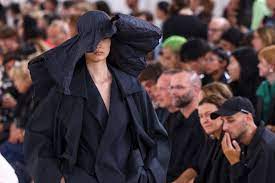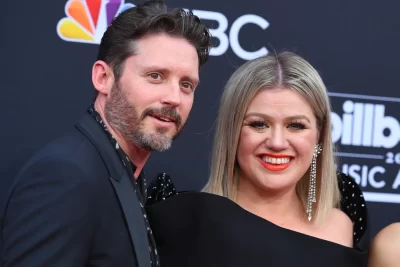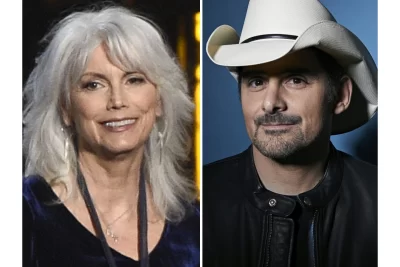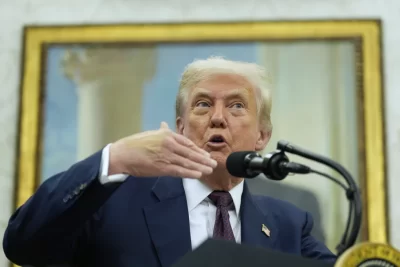
Flashes of intrigue greeted guests at Loewe’s meticulously designed space for Paris Fashion Week. Bright, other-worldly lighting brightened a dove-gray runway where gold modernist sculptures by American artist Lynda Benglis were scattered as if dropped by a fashion divinity, hinting at the merging of fashion and art.
The set mostly was a blank canvas upon which Jonathan Anderson put his latest designs, a collection that played with proportion and quirks.
Here are some Friday highlights from the Spring-Summer 2024 collections in Paris:
LOEWE LIFTS LIMITS ON WAISTLINES
The centerpiece of Anderson’s collection was a bold and surreal high-waisted silhouette, with pants in hues of camel, grey, brown, and black occasionally touched by vivid splashes of red, bougainvillea, and tangerine.
The models sometimes appeared as if the garments were consuming them. Hands disappeared into pockets below the high waists fully enveloping their torsos. Elsewhere, there were instances of pure sartorial poetry, such as a flowing brown gown that was part theater curtain, part ancient Greek goddess.
Loewe remains steadfast in pushing boundaries and redefining norms.
The collection also ventured into playful territory with unexpected details. Dresses seamlessly morphed into oversize handbags. Sparkly shoes added a touch of whimsy. Leather pieces, including sleek coats and chewed hems, showcased the Spanish heritage brand’s craftsmanship.
The presentation, despite its allure and thoughtful design, seemed to be a slight departure from the house’s typical high energy. To longtime Loewe aficionados, the collection felt more subdued.
ORIGAMI MEETS POETRY AT ISSEY MIYAKE
The Issey Miyake show opened with a flourish. Dancers performed bold, contemporary movements around the venue as they interacted with hanging origami sculptures to the sound of avant-garde orchestra music. The suspended paper sculptures harking from elements in nature hinted at the design inspiration for the collection.
The garments fulfilled Miyake’s reputation for innovation. The standout square, origami-styled coats showcased a distinctive touch, a blend of tradition and forward-thinking design. As models strutted down the runway, what started as abstract pieces eventually transformed into more structured and formal attire.
A poetic sense of nature’s fleeting phenomena was present throughout. Designs featured blurred gradient prints reminiscent of overexposed camera film, while fabric twists suggested breezy motions and organic forms. Textural variety was prominent, with garments ranging from soft, stretch-infused woven pieces to those boasting a lighter, airier feel, thanks to special weaving techniques.
Overall, the show was not just a presentation of clothes but a holistic experience in which movement, music, and fashion converged to make a statement. It was a reminder that at its best, fashion is not just wearable but an art form.






